The best whole house water filter system to buy in 2023 is the Springwell CF1 Model. It uses catalytic carbon + KDF media filtration to remove impurities such as bacteria, viruses, chlorine, chloramines, PFOA, PFOS, PFAS, pesticides and herbicides from tap water. Springwell CF1 also comes with 1 million gallons capacity, and 1 – 7 bathrooms options.
Homeowners also looking to buy a whole home water purification and water softener system combo to improve their tap water quality will be far-fetched to find a better deal than the Kind Water Systems E-3000 model, which offers a carbon filter & salt-free water softener at a considerably lower cost than other water filter models.
In this guide, We evaluated water purification filters using factors such as contaminants removed, NSF certification, bathroom size, water flow rate, durability, warranty, and customer reviews.
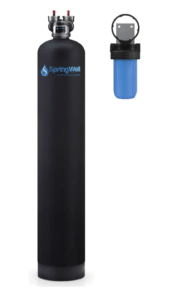
- Capacity: 1,000,000 gallons
- Flow Rate: 9 GPM – 20 GPM
- No. of Bathrooms: 1- 7
- Cost: $924
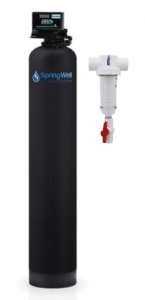
- Capacity: 1,000,000 gallons
- Flow Rate: 12-20 GPM
- No. of Bathrooms: 1-4, 4+
- Cost: $2,003
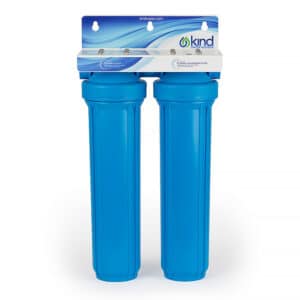
- Capacity: 80,000 gallons
- Flow Rate: 15 GPM
- No. of Bathrooms: 1-6
- Cost: $730
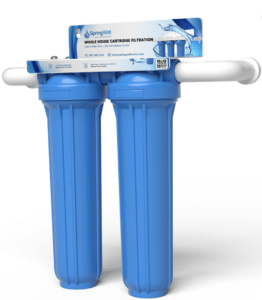
- Capacity: N/A (12-months Filter Life)
- Flow Rate: 20 GPM
- No. of Bathrooms: 1- 7
- Cost: $587
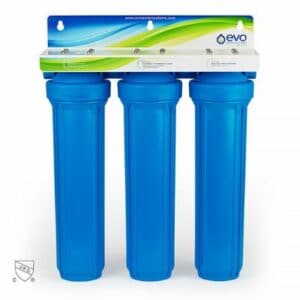
- Capacity: 80,000 gallons
- Flow Rate: 15 GPM
- No. of Bathrooms: 1-6
- Cost: $1,598
Expert Picks:
- Best for city/tap water: Springwell CF1
- Runner up for tap water: Aquasana Rhino EQ-1000
- Best for well water: Springwell WS
- Best cartridge-based: Kind Water E-1000
- Best filter & softener combo: Kind Water E-3000
- Cheapest Price: Softpro Carbon by Qualitywatertreatment
1. SpringWell CF1 Whole House Water – Best for Tap Water
The SpringWell CF1 home water treatment system uses a four-stage filtration process to remove 99.6% of impurities, chlorine, PFOA, PFOS and PFAS in city tap water. With a filtration capacity of 1 million gallons, and bathroom size of 1 – 7, the Springwell CF1 is an all-round quality appliance that will significantly improve your water quality.
For maximum filtration, consider paring this device with a UV water purifier (to remove viruses) or a reverse osmosis system (to remove fluoride).
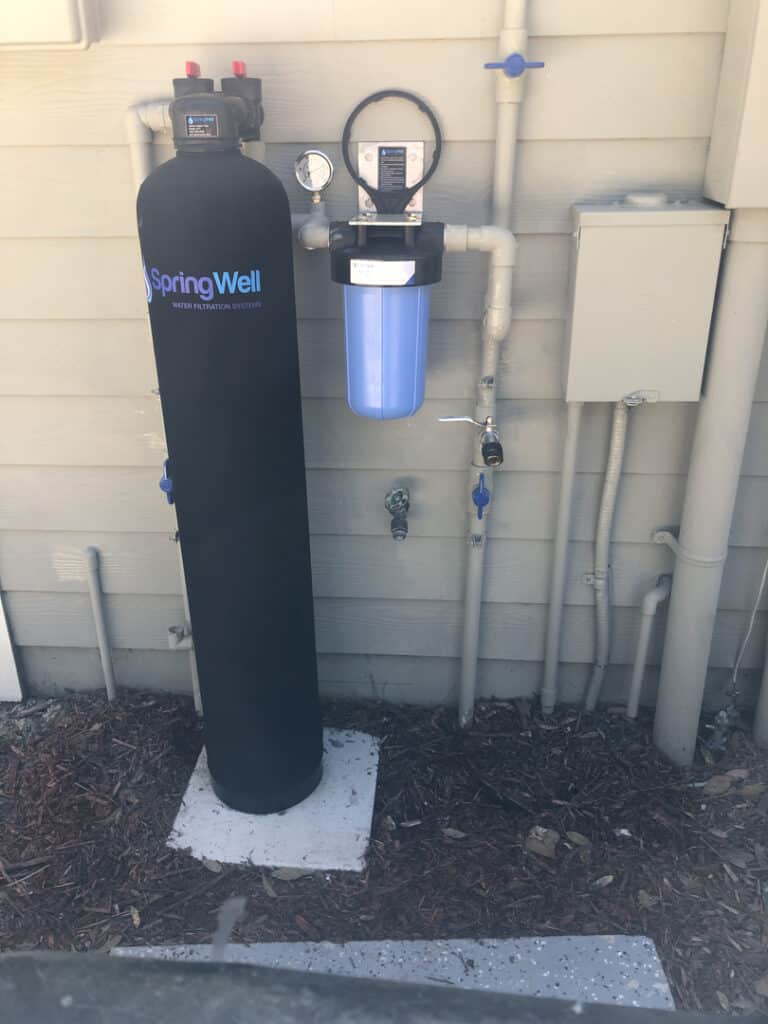
Here’s a quick breakdown of of how the Springwell CF1 Works:
The first stage of filtration utilizes a critical design called a flex bed that allows for maximum contact time, ensuring high filtration and reduction of channeling (water passing too fast through the layers). In the second stage, a KDF bed made of a copper/zinc alloy comes into play, eliminating chlorine, VOCs (volatile organic compounds), herbicides, and pesticides to great effect.
Then, a catalytic carbon bed filter supplements this by removing organic compounds. In the end, if there are any other harmful contaminants like dirt and clay left in the water, the 5-micron sediment filter removes them. The final output is clean and better tasting water devoid of viruses and bacteria.
Despite the complexity and efficiency of its filtration process, the SpringWell CF1 requires minimal maintenance. You only need to replace the 5-micron filter every 6 -9 months to keep the system working effectively.
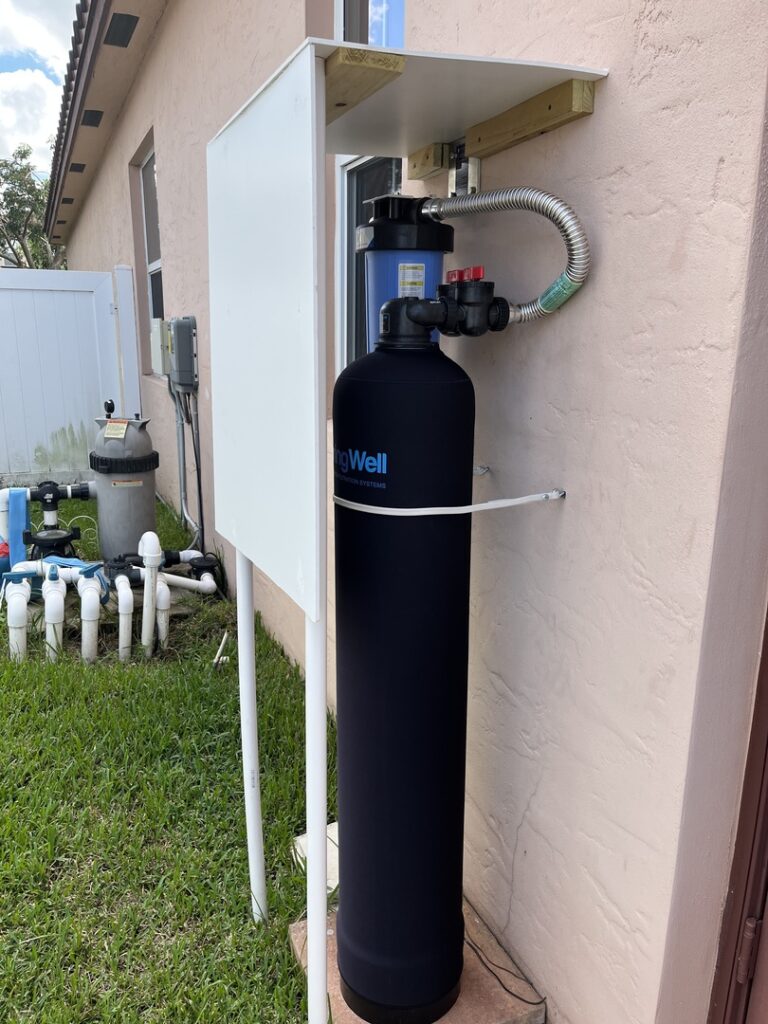
Another benefit of the Springwell cF1 home water purification system is its low effect on water pressure. It maintains a 9 GPM flow rate, which is ideal for houses with 1-3 bathrooms. For houses that have more, the Springwell CF1 comes with upgraded flow rate options; 12 GPM flow rate for 4-6 bathrooms and 17 GPM for 7+ bathrooms.
That said, the Springwell CF1 also has some disadvantages. For a product that’s made of high-quality material overall, having plastic made fittings is quite disappointing to say the least.
Update: Springwell just launched a cartridge-based water filter with almost similar offerings to the CF1 home water system we reviewed. It’s a cheaper cost and space saving alternative: Check it out.

- Capacity: 1,000,000 gallons
- Flow Rate: 9 GPM – 20 GPM
- No. of Bathrooms: 1- 7
- Cost: $924
- The best system for tap water
- Tested and trusted
- Requires low maintenance
- Produces noticeably clear water
- Plastic fittings
2. Kind Water E-1000 – Best Cartridge-Based Whole House Filter
The Kind Water Systems E-1000 is the best cartridge-based whole house water filter. It uses high-performance catalytically-activated coconut shell carbon block filter technology to remove impurities, chlorine, chloramines, dirt, and sediment.
The sediment gets collected into a pre-filter which can easily be removed and washed out. You won’t be able to do this indefinitely, and will need to replace the pre-filter every year or so, but you can still get a lot of mileage out of it in that time. The coconut shell carbon block filter also only needs to be replaced once a year.
The installation is simple and can be done DIY. All you need to do is mount it on your wall, attach the input and the output hoses, and you’re done. It doesn’t require any electricity, you don’t need to pre-soak the carbon media, and the filters are easily accessible and removable for maintenance purposes.
Being easy to attach and detach also means it’s convenient for transportation. While there are systems that are even more easily portable, like the iSpring, this unit can handle twice as many bathrooms, making it ideal for mid – large families.
For maximum filtration, we recommend you to also get a reverse osmosis system addition, especially if you’re looking to remove fluoride.

- Capacity: 80,000 gallons
- Flow Rate: 15 GPM
- No. of Bathrooms: 1-6
- Cost: $730
- 120-day satisfaction guaranteed return policy
- Very easy to install
- Doesn’t take up much space under the sink
- Lifetime warranty on Filter Housings
- High-Performance Carbon Block Filter
- A much shorter filter life than the other models on the list
- The website is pretty barebones when it comes to available information
3. Kind Water Systems E-3000 – Best Water Filter & Softener Combo
The Kind Water Systems E-3000 is the best whole house filter and softener combo due to its ability to purify and soften tap water at a cheaper price than other options. The E-3000 is very similar to the E-1000, only that it comes bundled with a salt-free water softener. This system can be an ideal option for homes with up to 6 bathrooms, and it’s very easy to install and maintain.
The main difference between Kind Water Systems E-1000 and E-3000 is that the E-3000 is a three-stage filtration unit instead of a two-stage process:
- The first stage is the 20-inch 5-micron pre-filter that’s meant to catch the larger sediment particles that might be present in the water.
- The second stage is the high-performance coconut carbon block filter that does the heavy lifting here since it gets rid of contaminants like lead, PFOA, PFOS, PFAS, pesticides, herbicides, chlorine.
- The third stage is the water-conditioning stage, where the water passes through a water softener that gets rid of magnesium and calcium hard water minerals. Unlike other softeners, the eSoft cartridge doesn’t use a sodium ion-exchange system, so the water that passes through the filter doesn’t end up with a salty aftertaste.
The sediment filter and the carbon filter will both need to be replaced once a year; however, the eSoft salt-free TAC filter doesn’t require replacement since it uses a physical alteration method to soften the water rather than a chemical one.
Finally, you should also get a reverse osmosis filtration system to complement your water filter & softener appliance. The Reverse osmosis process is very effective at removing fluoride and other contaminants that may not be easily removed by a standard whole house filter.

- Capacity: 80,000 gallons
- Flow Rate: 15 GPM
- No. of Bathrooms: 1-6
- Cost: $1,598
- Made from NSA certified components
- Can handle up to 75 GPG of hardness
- Doesn’t take up any floor space and can easily be moved if necessary
- No carbon dust produced and no carbon pre-soaking is required
- DIY Installation
- Doesn’t remove Arsenic or Fluoride
- Annual maintenance fees are required for the sediment and carbon filters
4. SpringWell WS – Best for Well Water
Purifying well water requires a stronger water filtration system than what is required for tap water due to the presence of iron and sulfur contaminants. In that case, the SpringWell WS impressed us with its ability to reduce 99% of iron and sulfur in our water. It is the best well water filtration system.
Private well is the breeding ground for contaminants like hydrogen sulfide (rotten eggs), iron, and other chemicals, but the four-stage filtration process of the SpringWell WS is very effective against them.
Compared to SpringWell CF1, the main difference is that the Springwell WS is an Air Injection Oxidizing Filter System which uses a bed of green sand fusion instead of a KDF to filter water. The pocket of air oxidizes hydrogen sulfide, iron, and manganese, and the green sand fusion backwashes all contaminants out of the bed via an Empress Vortech Tank.
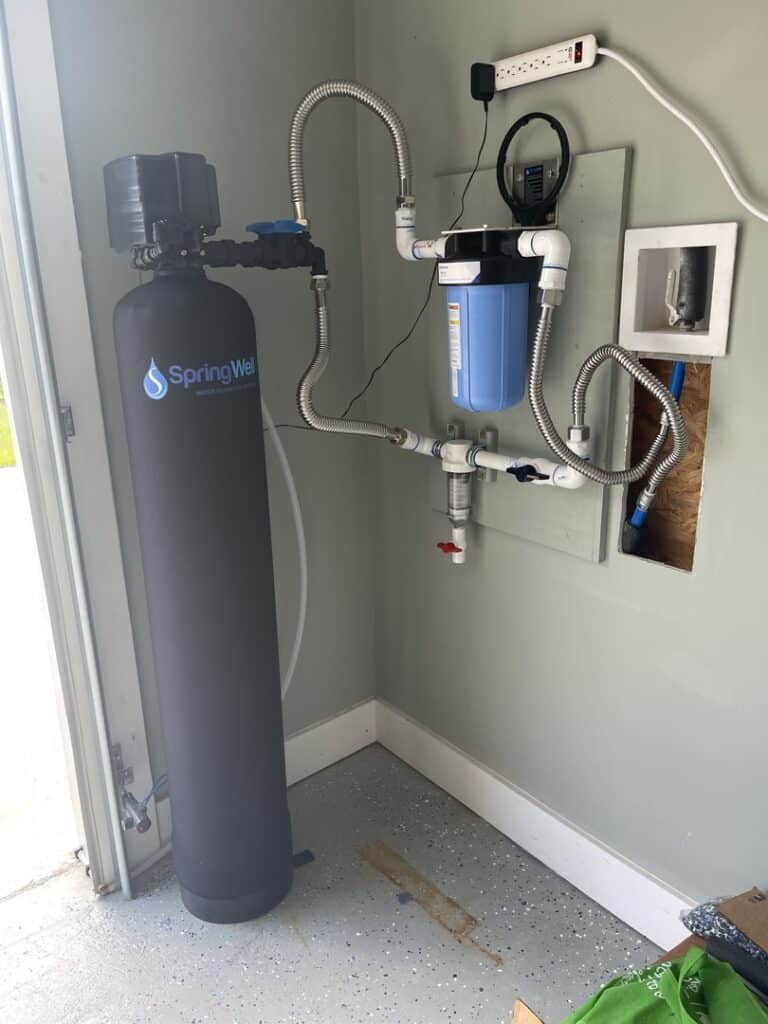
Ease of use and installation is another benefit of the Springwell WS we found useful. It comes with a Smartphone app and built-in Bluetooth made it easy to control the system and adjust settings such as control valve and water usage.
The SpringWell WS is manufactured with components that have been NSF-certified. However, they only provide a six-month money-back guarantee, but all tanks and valves come with a lifetime warranty.
Although the system’s upfront cost is high, the maintenance costs are low because of the single tank design.

- Capacity: 1,000,000 gallons
- Flow Rate: 12-20 GPM
- No. of Bathrooms: 1-4, 4+
- Cost: $2,003
- The best system for well water
- Improves orange and black staining problems
- Eliminates rotten egg sulfur smell
- No maintenance required
- No drop in water pressure
- Well water test kit add-on available
- Costly investment at the beginning
5. iSpring WBG32B Carbon Block Whole House Filter
The iSpring WBG32B water filtration system is another option for those looking for a sediment water filter. Although not as effective as other water filters in removing contaminants, it’s a more suitable solution for removing sediments and chlorine in chlorinated tap water.
The first stage of water filtration with the iSpring is the filtration of sediments. This stage removes large water particles like dust, dirt, silt, sand, and rust. It also works to prevent clogs later on in the filtration process.
Stages two and three involve the carbon block filter and the two CTO filters that work together to remove the chlorine and other chemicals that affect odor and taste of water. These filters also last a year and are able to produce 100,000 gallons of water in that period.
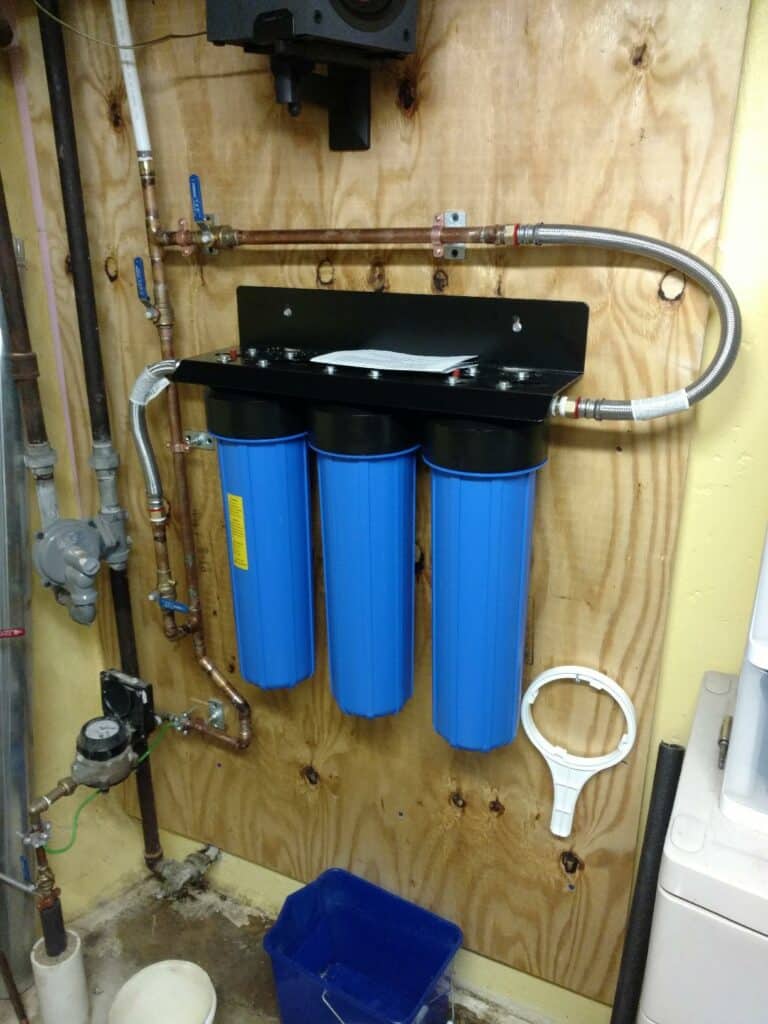
iSpring claims no loss in water pressure with the WBG32B, and we’re inclined to agree with them. Our evaluation found that the iSpring provides filtered water without losing water pressure through the taps.
Also, unlike other filters that waste gallons of water during either filtration or backwash, the iSpring WBG32B has a zero wastewater, which makes it an eco-friendly option.
Ease of use and maintenance are bonus points for this water system. The filters can be changed regularly with the help of the iSpring manual that comes with the system or an online video guide.
Compared to other options in this list, its inefficiency in eliminating contaminants might be a drawback for some. However, those looking to get rid of sediment in water may not find any better than the iSpring WBG32B.
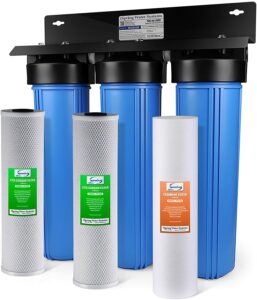
- Capacity: 100,000 gallons
- Flow Rate: 15 GPM
- No. of Bathrooms: 1-3
- Cost: $274
- Utilizes mechanical filtration and chemical absorption
- Eliminates bad odors in the water
- Removes 99% of chlorine present in water
- Easy installation and maintenance
- Adheres to third-party sanitation standards
- Online registration for extended warranty
- Cannot reduce total dissolved solids (TDS)
- Doesn’t really remove contaminants
- Bulky packaging
7. Aquasana Rhino Whole House Filtration System
The Aquasana Rhino is a worthy runner-up to the Springwell CF1 whole house water filter for tap water. It removes up to 97% of chlorine and reduces the presence of VOCs, mercury, lead, herbicides, and pesticides.
This system operates with a unique upflow dual tank. The tank works to prevent clogging or channeling, which is a common problem with water filter media.
The filtration process is supplemented by the bacteriostatic media, which protects your water supply and extends the lifespan of the filter itself. It prevents bacteria and algae from growing inside the system and potentially damaging the filter.
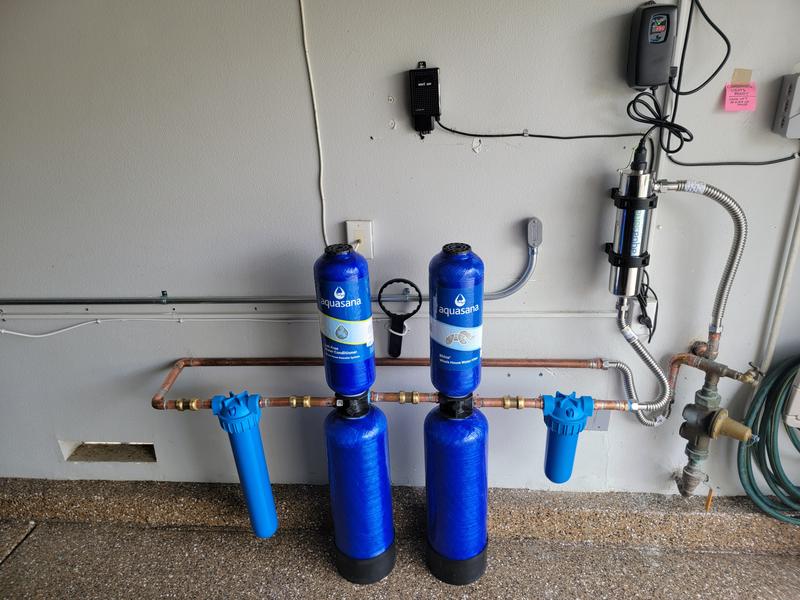
One benefit we really like about the Aquasana Rhino is how easy it is to fix. Maintenance is rarely required, but when it is, the process is simple and painless. The owner’s manual found on the Aquasana website in PDF format is very straightforward. The only real downside is that, in order for the warranty to be valid, professional installation is required.
The Aquasana Rhino filter system is also a little expensive at the outset, but the overall benefits far outweigh the high cost. If you’re interested in increasing the filter’s potency, you can easily add-on a salt-free water conditioner or a UV filter as well—with a bump in the price, of course.
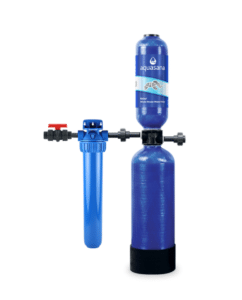
- Capacity: 1,000,000 gallons
- Flow Rate: 7 GPM
- No. of Bathrooms: 1-3
- Cost: $878
- Add-ons available for salt-free conditioner, UV filter, and pro-grade install kit
- Independently-tested system
- Removes up to 97% of chlorine present in water
- Improves your home’s air quality
- 10-year filter life and 10-year limited warranty
- Costly (If you include add-ons)
- Professional installation required for warranty
7. SoftPro Carbon UpFlow Home Water Filtration System
The SoftPro Carbon is a high performance but affordable home water filtration system that combines seamlessly with a water softener.
Don’t be alarmed by its affordability—it doesn’t imply a lesser quality or worse filtration technology at all. On the contrary, the SoftPro Carbon has an upflow design, just like SpringWell systems, which eradicates contaminants in a more efficient way than most downflow water filter systems.

An advanced catalytic carbon media does the filtering in the SoftPro system, and it’s kept clean by a chemical-free and catalytic backwash. The SoftPro Carbon is made of copper and zinc and uses oxidation and reduction to get rid of dissolved contaminants in water. This includes impurities, heavy metals, chlorine, herbicides, pesticides, and highly dangerous chloramines.
The SoftPro Carbon maintains high flow rates during filtration while ensuring minimal wastewater. The filter lasts up to six years, while providing 1,000,000 gallons of water during that period. This makes it one of the most durable and economical options in this list.
That said, it has some limitations such as inability to remove total dissolved solids or fluoride from. But, it’s a decent option for those looking to have relatively healthy, odor- and taste-free water.
Buyer’s Guide
Evaluating whole house filters requires a lot of research and data-gathering. Consider the following criteria before making your purchase:
- NSF Certification
- Contaminants filtered
- Home size/number of bathrooms
- Flow rate
- Micron ratings
- Maintenance requirements
- Price
Key Considerations
NSF Certification
The National Sanitation Foundation, founded in 1944, is the organization that sets standards for food safety and sanitation. Following NSF directives, water filter brands know the rules and safety guidelines to implement in the factory.
These rules, or rather sanitation guidelines, help ensure that materials used in the foodservice industry is truly safe. It also translates to items used in the home, like systems engineered for purifying, softening, or filtering water.
Having a certification from the NSF means that the numbers and figures a brand boasts of have truly been subjected to tests and confirmed true. Therefore, you should only consider water filter systems that are NSF-certified and compliant with all technical requirements.
Contaminant Reduction Capacity
Consider a water treatment device that can remove the following contaminants:
- Impurities
- Viruses
- Manganese
- Sulfur
- Chlorine
- Chloramines
- Copper
- Lead
- Iron
- Sodium
- Dissolved solids
- Nitrates
- Bacteria
- Sediment
- Dirt
We examined these filters by looking at how many contaminants they effectively removed. Not only does the removal of these particles help your water taste better, but it also improves the smell and your overall health.
System Capacity/House Requirements
Depending on how big your house is, different water filter sizes may be necessary. The number of bathrooms will also impact how well these systems work.
Ideally, you should go for a filter that matches the size of your home. Consider each water dispenser in the house and how many gallons per minute (GPM) are dispensed when making a purchase.
| Water Filter Systems (Best to Worst) | Number of Bathrooms |
|---|---|
| SpringWell CF1 | 1-7 |
| Kind Water Systems E-1000 | 1-6 |
| Kind Water Systems E-3000 | 1-6 |
| Softpro Carbon | 4-6 |
| SpringWell WS | 4+ |
| iSpring WGB32B | 1-3 |
| Aquasana Rhino | 1-3 |
Water Flow Rate
If your water filter’s flow rate is too low, you’ll experience annoying disruptions in the water flow across the house. Your filters should match the flow rate of your home’s water dispensers.
A shower has a flow rate of about 2.5 to 5 GPM. Dishwashers are around 5 GPM, and toilets are about 3 GPM. Knowing the flow rate will help you pick the right system to keep up with the required needs.
| Water Filter Systems (Best to Worst) | Flow Rate |
|---|---|
| Aquasana Rhino | 37 GPM |
| SpringWell WS | 12 – 20 GPM |
| SpringWell CF1 | 9 – 20 GPM |
| Kind Water Systems E-1000 | 15GPM |
| Kind Water Systems E-3000 | 15GPM |
| iSpring WGB32B | 15 GPM |
| SoftPro Carbon | 9 – 14 GPM |
Filter Micron Ratings
Micron rating determines the filtration capacity and efficiency of your water filter. Here are a few things you should know about micro ratings:
- We measure microns at a thousandth of a millimeter or a micrometer.
- The smaller the micron number, the better.
- Smaller micron ratings filter more but clog easily.
- A 5-micron rating removes a lot of debris without getting as clogged.
- You can use multiple filters at one time if you aren’t satisfied with the micron rating.
Maintenance Requirements
Water filters are typically built to last for years. However, as with most things in life, proper maintenance is necessary to extend its lifespan.
You should consider getting a low-maintenance water filter system especially since you’re going to be using the device for many years.
System Cost
Of course, the price is a major factor when we’re out shopping for anything. Whole house water filters aren’t cheap, so, you should consider getting one that fits your budget.
Frequently Asked Questions
A whole house water filter costs $1,000 – $5000, although some budget water filters sell for as low as $500.
A whole house water filter should be installed beside or near the primary shut-off valve. It is a point-of-entry system and therefore, should be installed on your main water line. The main water line is often located in the basement, garage or outside the house. If you’re replacing an old water filter system, you can simply remount the new system in its place.
Parts of your water filter system will need to be replaced somewhat regularly. A good rule of thumb is to replace the filters in your system every 3 to 6 months.
Some systems have long-lasting filters that often don’t have to be replaced. This is usually true of newer models that have more advanced technology. Multi-filter systems will also require less maintenance or regular replacement.
Regardless, more often than not, brands specify when a certain filter should be changed, either in instruction manuals or during your purchase. Most of them even have their subscription-based filter programs. Should you subscribe to those, you’ll get new filters even before the old one is worn.
● SpringWell
● Kind Water Systems
● iSpring
● Aquasana
These brands have proven to be some of the most effective, efficient, and affordable brands. SpringWell is arguably at the top of the list since its products can provide highly effective filtration processes at reasonable price and low maintenance costs.
The Springwell CF1 whole house water filter removes 99% of PFOS, PFAS, chloramines chlorine, fluoride, nitrates and arsenic. For maximum filtration, consider pairing your whole home filter with a reverse osmosis filtration system, which effectively removes 99% of fluoride.
A 5-micron rating will filter the majority of water contaminants. Since some smaller filters can have problems with clogging, a dual-filter system is often the solution.
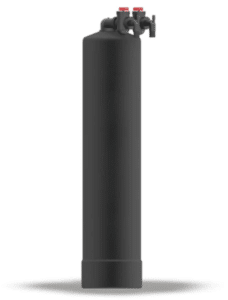
I notice that there is no mention of fluoride removal by any of these water filter systems. Can anyone tell me where I can find a filtering system that will also filter the added fluoride in my water supply?
Hi Rebecca, the whole house systems generally do not feature the methodology/technology to also filter or treat the fluoride in the water. This is typically where point-of-use systems like the under-sink or counter-top systems that feature reverse osmosis come into the picture when fluoride filtering/treatment is required. There is at least one whole-house system in the market that does that function, but we didn’t feature it in our list as it doesn’t make it to our top list overall. Those readers that are especially concerned about fluoride, they will for example get a SpringWell whole-house system and then install a SpringWell RO point-of-use system at the kitchen sink for drinking water.
When you evaluated whole home water filtration systems did you include Kind Water Systems? They have a 5 micron pre and post filtration, a carbon filtration/treatment (an activated block carbon), and a softening step that uses calcium and magnesium. If you look at multiple vessel filtration units (i.e. Aquasana), Kind Water Systems looks the same on the surface, but Aquasana uses a KDF filter. Have you compared the 2 brands? If so, was there a reason that Kind Water Systems did not make your top 7 models?
I think that having the water treatment in separate vessels like Aquasana and Kind Water Systems instead of a single vessel like Springwell allows one to replace sections without replacing the whole system.
I would like your opinion on GAC (granular activated carbon) vs. a carbon block.
Finally, is it a valid claim by water filtration/treatment systems that the hard water scale in pipes and nozzles in the shower and sink will clear up and disappear over time? If this is the case, then a future re-piping could be prevented by adding a water filtration/treatment system.
Thanks.
Hi Dale, yes, we are are aware of Kind Water Systems. They’re relatively new to the scene compared with some of the other more established brands. We do have them on our list of future articles to closely review their products. Early appearances are good about what they’re offering, but given so many excellent choices from long-established brands, as a consumer, we wouldn’t feel there’s a need to forego one of the existing choices for something that very likely isn’t going to be dramatically better.
We do believe that GAC systems work quite well and they’re a very reasonable choice in systems vs. a more traditional carbon block. The trade-off is that GAC will likely more often have a higher flow rate (gpm) than a traditional carbon block. The latter will likely filter better, but at a cost of less flow. If the flow is good enough from a system with a traditional carbon block, that is probably the better option.
Regarding filtered/treated water eventually clearing scale, we view that with a healthy measure of doubt. If you have hard formed scale on fixtures and other surfaces, just using better water going forward very likely won’t make that scale go away anytime soon. It depends on the level of scale and the duration that it’s been deposited and sitting there. Generally speaking, only in more extreme circumstances of the hardest water that has been in place for man years will you need to replacing plumbing in a household. The best course of action is to get water treated as early as you can and not let the scale build up over too long a period of time.
Our house is on a community well. We believe the developer should put a filtration system on the well and if he does not, we will install one at our home. The iron and manganese levels are near or slightly exceed the allowable limits. We think the ispring model is best for our house and perhaps the Springwell would be better at the well head. Another site indicated that the Ispring is effective in filtering out iron and manganese. Your review indicates this model is not as effective at filtering sediments and we are not sure which sediments are not filtered as well. We have 2.5 bathrooms so the Ispring seems to fit our family size. Do you believe the ispring will be effective for us to remove iron and manganese? Thanks!
Hi Marc, if you’re referring to the iSpring WBG32B, we in fact indicated that it’s quite excellent at sediment filtration. It’s not as effective at removing other contaminants than the other systems. Yes, the SpringWell systems are consistently excellent and favorites of our readers. The WS model would be especially good at the well head and for filtering iron and manganese. If you can only do one system, sediment is a concern, and you indicated iron & manganese levels are not a big issue, then the iSpring will likely do well as a choice.